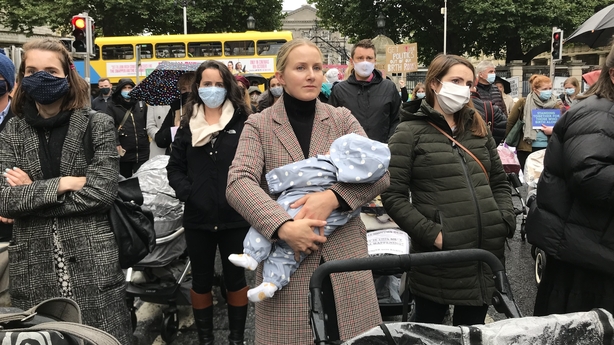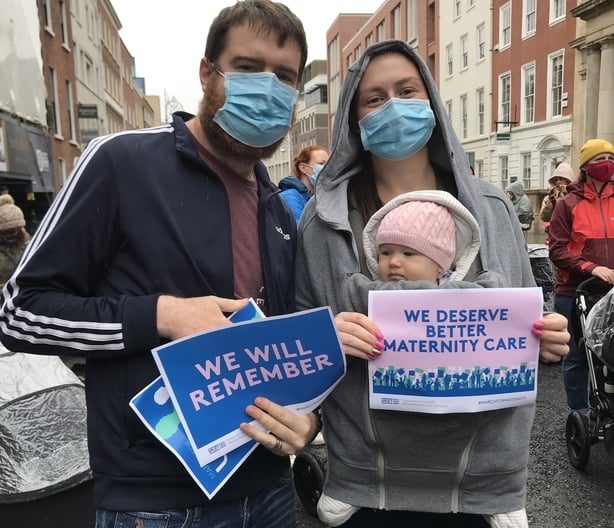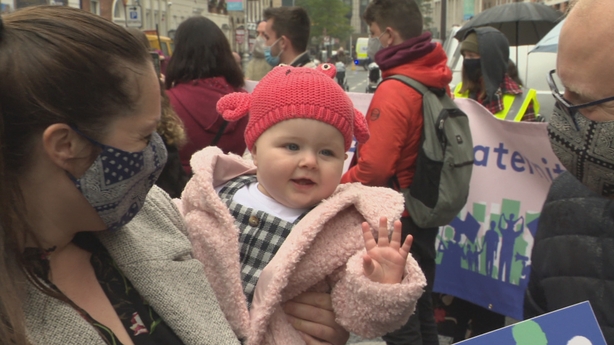Women and their partners from all over the country gathered outside Leinster house this afternoon to protest restrictions on partners accompanying pregnant women in maternity care.
Protestors at the March for Maternity called on Minister for Health Stephen Donnelly to take action to make Covid-19 protocols in all maternity wards and hospitals the same.
"We have had promises from the Minister for Health Stephen Donnelly that he would lift these restrictions and he hasn't done so yet," said Emma Carroll from the Better Maternity Care campaign.
Ms Carroll said that during a meeting with the HSE last week, the Executive said not all maternity hospitals are complying with the latest guidance from the Health Protection Surveillance Centre (HPSC).
She also said that even the current guidelines around partners attending pregnant women in maternity care do not go far enough and need to be expanded.

At the end of June, Mr Donnelly said that all maternity hospitals and wards would be following the same guidelines from then on, and in May Chief Medical Officer Dr Tony Holohan had said that "there was no good reason in public health terms" why restrictions on partners' attendance would be in place.
However, Ms Carroll said people who are pregnant are presenting to some hospitals and their partners are being turned away at the door.
"It’s not just that you’re separated at the door, it’s not the hurt and the pain of that, it’s the anxiety of knowing that you’re going to be alone and not knowing how long you’re going to be alone for."
HPSC and HSE guidelines say partners should be allowed to attend both the 12-week and 20-week scan. However Ms Carroll said that "for the most part, partners are being allowed in for the 20-week scan, but that’s not the case for the 12-week scan in many units.
"That’s typically when you might find out if you’ve had a miscarriage."

Currently, women who are pregnant experience different restrictions for their partners in different hospitals across the country.
Restrictions are imposed by each maternity hospital or ward, and include, partners only being able to attend when the person is in active birth or labour, for the birth itself, and for delivery by C-section, and not in the time preceding the active labour.
Some maternity wards are also restricting the amount of time a partner can be present post-birth, and some wards only allow a two-hour daily visit after the baby is born. In some cases they only allow that within set visiting hours.
"The one thing that connects us is that in order to get here, someone, a woman, gave birth to you, it is an important job"
— RTÉ News (@rtenews) October 6, 2021
Protestors gathered outside Leinster House today demanding an end to maternity restrictions that limit a partner's attendance| More: https://t.co/lMfgDyIuSe pic.twitter.com/BIzhRbJqup
Irish Actress Amy De Bhrún was one of the speakers at today's protest. She gave an emotional speech about her experience of labour. Her son is only two weeks old.
"Our needs for maternity care are not being met. This country has a long checkered history with the mistreatment of women in our society."
One couple, Shane and Bridget Flemming, travelled from Cork for the protest. They had their daughter Loreli in December last year, and even at that time they said they did not envisage Shane having to wait outside until Bridget was in active labour.
"I dropped Bridget off at the hospital on a Tuesday morning, and was not allowed in until Thursday night at midnight. I was allowed in for five hours, then I was told to leave and pick her up in two days time, and she was alone all that time," Mr Flemming said.

"It was petrifying with no support, so we’re here today for everyone who is going through it now and in the future, it just needs to end, it's ridiculous," Ms Flemming said.
Sissi Mehes gave birth to her first baby six weeks ago in the Rotunda Hospital. "It was my first pregnancy, I didn’t really know what to expect of labour. I really needed my husband with me, I really needed him there."
"I was terrified, and I was so grateful when my husband was finally allowed to come in with me."
"I would have thought that by now, the restrictions would have been done, it would have been over, but they just continue, and I don’t think there are any good reasons not to lift them."
There was cross-party support for the protest with many TDs taking the time to come outside to hear their demands.
As the protest was taking place outside Leinster House, inside, the Aontú Leader Peadar Tóibín introduced a Private Members bill on Maternity Care.
It seeks to ensure mothers receiving maternity care can be accompanied to appointments in hospital and during childbirth by their partners.







